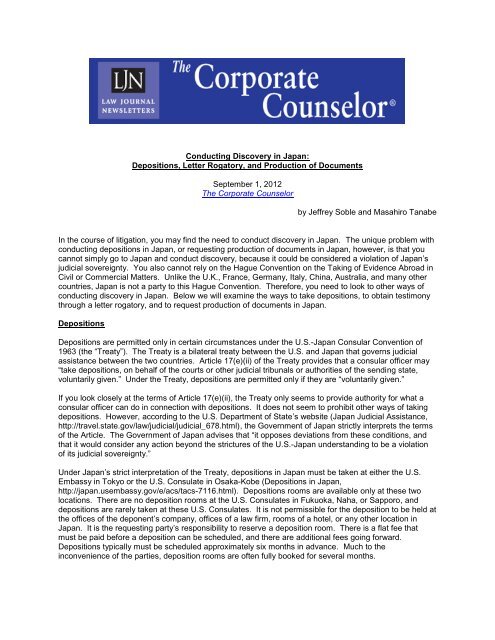Best Practices for Drafting Effective Letters Rogatory for Legal Matters
Best Practices for Drafting Effective Letters Rogatory for Legal Matters
Blog Article
The Duty of Letters Rogatory in International Law: Key Insights
Letters rogatory offer as a critical tool in worldwide law, promoting cross-border legal assistance by permitting jurisdictions to officially request proof and actions from one an additional. What ramifications might these challenges have for future lawful proceedings?
Definition of Letters Rogatory
In the world of worldwide regulation, letters rogatory function as formal requests provided by a court in one territory to seek aid from a court in one more territory. Letters rogatory. These requests are specifically significant in cross-border lawful proceedings, where the enforcement of a court's order or the event of evidence may be restrained because of administrative limitations

The process generally calls for the requesting court to articulate the details details or action required from the international court, adhering to the lawful procedures and conventions established in between the territories involved. As soon as provided, the letters rogatory are transmitted via diplomatic networks, which might include consular offices or embassies, to ensure that the demand is recognized and acted on by the foreign court. Overall, letters rogatory exhibit the cooperative structure important for reliable worldwide lawful processes.
Historic Context
Although the method of letters rogatory has old roots, its formalization within the structure of international regulation emerged substantially in the 20th century. Historically, such requests for judicial aid were utilized in numerous legal customs, consisting of Roman law, where they promoted cross-border collaboration in lawful matters. The idea obtained renewed interest with the surge of globalization and the enhancing intricacy of global legal communications.
The mid-20th century saw the facility of treaties and conventions that sought to standardize the procedure of letters rogatory. Notably, the 1970 Hague Convention on the Taking of Evidence Abroad in Commercial or civil Matters supplied an organized approach, improving the efficiency of these demands - Letters rogatory. This period marked a change from casual setups to a more methodical structure, which dealt with the difficulties postured by differing nationwide lawful systems
As states ended up being more interdependent, the requirement for reliable devices to gather evidence across borders ended up being evident, enhancing the duty of letters rogatory in facilitating international collaboration. Today, they stay an essential tool for obtaining evidence and ensuring that justice transcends national borders, reflecting the evolving nature of international law in response to global challenges.
Refine of Issuing Demands
The procedure of releasing letters rogatory typically involves several essential actions created to make sure that demands for judicial help are clear, certain, and compliant with both international and residential lawful requirements. At first, a celebration seeking assistance has to prepare an official demand that describes the important facts of the case, the alleviation sought, and the particular evidence or testament needed. This record needs to be crafted with precision to fulfill the lawful requirements of the territory in which it will be sent.
Complying with the preparation of the demand, it is submitted to the ideal authority, commonly a court or a designated governmental firm. This authority examines the request to guarantee it abides by lawful standards and step-by-step norms. When approved, the demand is transmitted to the international jurisdiction with polite channels.
Upon invoice, the foreign court examines the request's compliance with its neighborhood legislations and techniques (Letters rogatory). If accepted, it continues to execute the request, which might involve the issuance of subpoenas or the collection of proof. Throughout this procedure, maintaining clear interaction in between the requesting and getting territories is important to make certain successful participation and the satisfaction of the request
Challenges and Limitations
Obstacles and restrictions frequently develop in the procedure of executing letters rogatory, commonly stemming from differing legal systems and treatments between jurisdictions. One considerable challenge is the differing standards of admissibility for evidence, which can result in issues in the approval of documents requested through letters rogatory. Furthermore, the lack of harmony in lawful terms and interpretations can develop misunderstandings, complicating communication between courts in different countries.
Furthermore, delays are typical as a result of governmental procedures, as the demand may require to pass through multiple layers of legal authorities before it is fulfilled. In some instances, the asked for territory might do not have the essential sources or readiness to coordinate, better preventing the procedure. Language obstacles additionally add to difficulties, as precise translation of legal files is important for guaranteeing that the intended message is conveyed without distortion.
Lastly, sovereignty concerns might develop, as some states are hesitant to adhere to requests that they perceive as infringing upon their lawful freedom. These difficulties highlight the complexities inherent in the usage of letters rogatory, demanding higher harmonization and collaboration among global lawful systems to enhance see this page their effectiveness.

Effect On International Collaboration
Acknowledging the value of letters rogatory in fostering worldwide teamwork is critical, as these requests help with cross-border legal help and advertise joint initiatives in criminal and civil matters. By allowing one jurisdiction to officially ask for help from an additional, letters rogatory develop an organized lawful structure that enhances the efficiency of international communication between judicial authorities.
The use of letters rogatory helps to establish mutual count on and respect among nations, which is important in a progressively interconnected world. They function as a mechanism not only for gathering proof yet additionally for making certain that lawful procedures are maintained throughout borders. This is particularly essential in combating transnational crime, where the my site inability to safeguard participation can threaten justice.
Moreover, the reliance on letters rogatory can enhance intricate lawful procedures, decreasing delays and unpredictabilities in global investigations. The procedural safeguards inherent in this procedure add to the protection of individual civil liberties while assisting in collaboration among states. Inevitably, the effect of letters rogatory on international participation emphasizes their function as vital devices in the promotion of justice, cultivating a collective spirit that transcends nationwide limits and legal systems.
Final Thought
Finally, letters rogatory act as an important tool in worldwide regulation, assisting in cross-border legal help and collaboration. Regardless of fundamental obstacles such as differing administrative hold-ups and legal criteria, their standardized treatments advertise depend on amongst nations. The ongoing evolution of these mechanisms is crucial for improving the performance of international lawful procedures, ultimately promoting more powerful collaboration in both criminal and civil issues across territories. The relevance of clear communication in this context can not be overemphasized.
Letters rogatory serve as an essential tool in global regulation, facilitating cross-border legal assistance by enabling jurisdictions to formally request evidence and actions from Read Full Article one another.The process typically needs the requesting court to verbalize the certain info or activity needed from the foreign court, adhering to the legal protocols and conventions established between the jurisdictions entailed. Historically, such demands for judicial aid were made use of in numerous lawful customs, including Roman legislation, where they helped with cross-border collaboration in legal matters.The procedure of releasing letters rogatory normally entails a number of vital steps developed to ensure that demands for judicial aid are clear, certain, and compliant with both global and residential legal standards.In addition, hold-ups are typical due to bureaucratic processes, as the request might need to pass through multiple layers of legal authorities before it is met.
Report this page